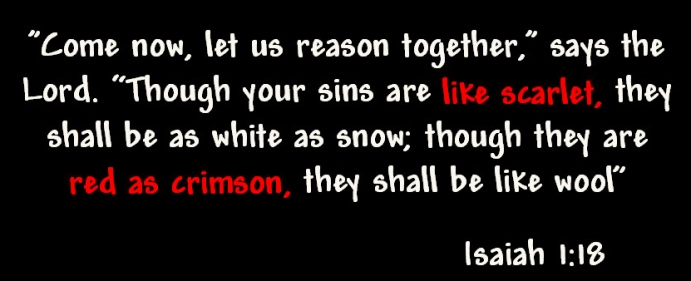Isaiah 1:1-31; 18
"Come now, let us reason together, says the Lord: though your sins are like scarlet, they shall be as white as snow; though they are red like crimson, they shall become like wool" (Isa 1:18, ESV). [Alternate titles: Failure; A Complete Comprehensive Failure; A Call to Repentance.]
Theme: Despite our multitude of failures, God wants to reach out to us, have a conversation with us and restore to us the joy of having an intimate relationship with him.
"Come now, let us reason together, says the Lord: though your sins are like scarlet, they shall be as white as snow; though they are red like crimson, they shall become like wool" (Isa 1:18, ESV). [Alternate titles: Failure; A Complete Comprehensive Failure; A Call to Repentance.]
Theme: Despite our multitude of failures, God wants to reach out to us, have a conversation with us and restore to us the joy of having an intimate relationship with him.
God is my salvation. Isaiah is often regarded as the apostle Paul of the OT and the Shakespeare of the prophets. Most of Isaiah is written in poetry, not prose. The name Isaiah means "the salvation of the Lord" or "the Lord is salvation" (Isa 12:2). Isaiah is the second most frequent quoted book in the NT. The NT quotes Isaiah 66 times, surpassed only by Psalms (79 times).
There are many ways to outline Isaiah. A simple way is to consider this large prophetic book of 66 chapters in 2 parts:
There are many ways to outline Isaiah. A simple way is to consider this large prophetic book of 66 chapters in 2 parts:
- Judgment from the Holy One of Israel (1-39): The Assyrian period. Conflict and victory.
- Salvation from the grace of the Suffering Servant (40-66): The Babylonian period. Hope in troubled times.
"The vision concerning Judah and Jerusalem that Isaiah son of Amoz saw during the reigns of Uzziah, Jotham, Ahaz and Hezekiah, kings of Judah. Hear me, you heavens! Listen, earth! For the Lord has spoken..." (Isa 1:1-2a)
- what God was doing with the nation,
- why he was doing it, and
- where everything was heading under his sovereign control.
In his commentary, OT scholar J. Alec Motyer titled Isaiah 1 as "A comprehensive failure," which is a bleak but appropriate title. Judah and Jerusalem failed completely in three ways:
- Nationally (2-9).
- Religiously (10-20).
- Socially (21-31).
- 9 commands (16-17).
- A promise they can experience (18).
- A blessing they can find (19) or lose (20).
- Your heart: Make yourself clean (16a)
- wash,
- make yourselves clean,
- Your life: Reorder your personal life (16b-17a).
- take your evil deeds out of my sight.
- stop doing wrong,
- learn to do right,
- Your society: Reform society (17b).
- seek justice.
- rebuke the oppressor (Isa 1:17, NKJV), correct oppression (Isa 1:17, ESV), correct the oppressor (Isa 1:17, HCSB),
- take up the cause of the fatherless,
- plead the case of the widow.
Grace instead of judgment. Isa 1:18-20 is deservedly one of the most famous expressions of the grace of God in the Bible. The theme of rebellion has been progressively developed through 2-17. Their sins are scarlet, red as crimson. Scarlet is the color of guilt (Isa 1:15). A point of crisis is reached. But at the very point when judgment is expected, grace intervenes. Reason (sometimes used of arguing a case in court) is where the Lord calls his people to the bar of his justice, where they can only be found guilty. But it is there that they amazingly hear the words of free pardon. The divine judge reasons with the accused, and makes an offer which is truly amazing in its generosity. It is nothing less than total pardon (Isa 1:18)! The promise of being like snow and wool (both naturally white) is of a new, holy nature, not just the cleansing away of the past.
III. Obedience is a means of grace
In response to God's grace and free pardon they must obey willingly (Isa 1:19), not just offer conformism. The commands of Isa 1:16-18 are backed by serious divine sanctions: obedience is the key virtue of God's people (Isa 1:19) and disobedience their worst enemy (Isa 1:20).
Isaiah 1 is an awfully bleak chapter that depicts not only Judah and Jerusalem, but is also descriptive of every civilization in history. Mankind truly has no hope, despite their best efforts. Man's only hope is found in the magnanimous generosity and grace of God (Isa 1:18).
References:
- Motyer, J. Alec. Isaiah. Tyndale Old Testament Commentaries. IVP. Downer's Grove, IL, USA. 1999.
- Webb, Barry G. The Message of Isaiah. The Bible Speaks Today. IVP. Downer's Grove, IL, USA. 1997.

No comments:
Post a Comment